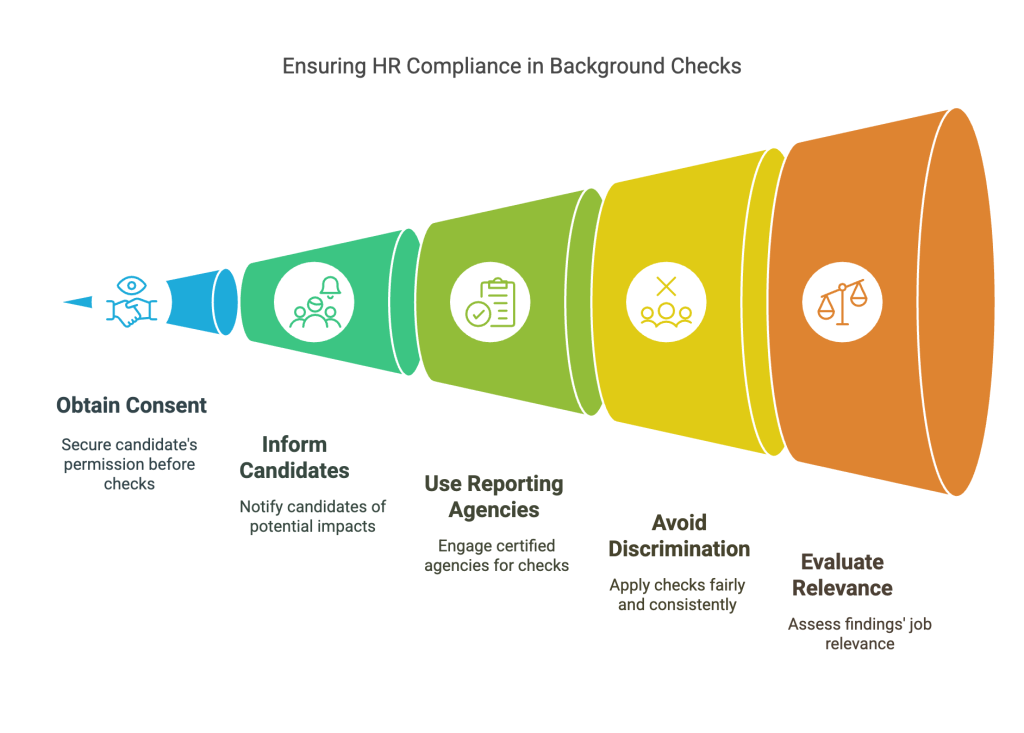From bustling cityscapes to tranquil rural settings, Georgia boasts a remarkable array of locations that have helped transform the state into a powerhouse within the film industry. However, as Georgia continues to attract an array of high-profile film and television projects, the need for comprehensive and compliant background checks is paramount. This guide will delve into the intricate details of background checks specific to the Georgia film industry, addressing their significance and presenting actionable practices for employers and job seekers alike.
Key Takeaways
- Georgia's film industry requires diligent background checks to ensure safety and credibility on set.
- Thorough screenings safeguard productions against potential legal and safety issues.
- Different roles in the Georgia film industry necessitate various types of background checks, like criminal and employment verifications.
- Challenges in background screening include short-term contracts, outdated technology, and privacy concerns.
- Compliance with Georgiaâs legal requirements for background checks is crucial to protecting your production team and reputation.
Introduction
Georgia's film industry is booming. From Atlanta's bustling streets to the serene woods of the North, filmmakers have ample choice for setting their stories. Big-name projects like "Stranger Things" and "The Walking Dead" have put Georgia on the map. The state's appeal is more than skin deep, though. Behind the scenes, a rigorous process supports this vibrant industry. Background checks are a key part of this support system.
Why are they so crucial?
In film, trust isn't just nice to haveâit's essential. You need to know that the crew and cast you hire are both qualified and reliable. Background checks help confirm this. They ensure everyone on set is who they say they are and can do the job safely. Safety is paramount. So is compliance with legal requirements, which vary by state and profession.
For Georgia, understanding these details can keep your production smooth and above board. If you're an employer or job seeker in the film industry, knowing the ins and outs of background checks can give you a competitive edge.
Consider: How would you handle a hiring mishap that a simple check could have prevented?
By embracing thorough screening, you're not just ticking a boxâyou're protecting your project and everyone involved.
Understanding the Necessity of Background Checks
Safety in film production is non-negotiable. Background checks form the backbone of maintaining that safety. Imagine a set bustling with activityâdirectors, crew, and actors all working closely together. You need assurance that everyone involved has a clean history relevant to their role. Background checks help you ensure that.
Credibility also matters. The film industry is teeming with talent, but with that competition comes the constant push to stand out. Comprehensive background checks boost your credibility. They show that you care about professionalism and the reputation of your project. Who wants to risk potential scandals or unprofessional behavior on set?
About the legal side, Georgia has its own mandates. Employers must comply with both state and federal requirements. These often include confirming identities and checking criminal histories to ensure no prohibitive offenses exist. Remember, compliance isn't just a box-ticking exerciseâit's about building a trustworthy environment.
So, why are background checks necessary? They are the unseen force that helps keep your film production safe, credible, and compliant. As someone with decades of experience, I urge you to always prioritize these checks. Being thorough here saves potential headaches so you and your team can focus on creating art without concerns.
Types of Background Checks in the Georgia Film Industry
Different roles in the film industry demand a variety of background checks. Understanding these checks can help you make informed hiring decisions or prepare for a job.

Criminal Checks for Film Industry Roles
Criminal checks are vital for safeguarding the workplace, especially in environments where trust is key. By identifying past criminal conduct, these checks help mitigate risks and protect the reputation of the production. For example, knowing if an applicant has a history of violence can be crucial in deciding whether they should be in close contact with cast or crew. Not all crimes will disqualify a person, but the nature of the offense and relevance to the position should be considered.
Employment Verification for Film Jobs
Employment verification ensures candidates have the experience they claim. This is particularly important in film, where specific skills and reliability are crucial. For instance, if a candidate claims expertise in special effects, verifying their past roles can confirm their capacity to execute tasks effectively. Verifying work history can also highlight gaps that may be worth exploring in an interview.
Reference Checks and Reputation
Conducting reference checks allows you to gauge a candidateâs professional behavior and past performance. Reaching out to previous employers or colleagues can provide insights into an applicantâs work ethic and collaboration skills. In a field where reputation matters, this step helps confirm if an individual possesses the professionalism needed in high-pressure production environments. Obtaining genuine feedback can prevent costly missteps in hiring unsuitable individuals.
When performing any background check, itâs important to be consistent and compliant with legal standards. Always inform candidates of their rights and obtain necessary permissions before proceeding. Being thorough and transparent can lead to better hiring decisions and a more reliable workforce.
Challenges in Background Screening
Background checks in the film industry aren't simple, especially in a state like Georgia with its bustling production scene.
Film industry roles often come with short-term contracts, making the process trickier to manage. Freelancers bounce from project to project, and their diverse work history can be tough to verify. Employers often find it challenging to track down concrete information about someone's past work when the industry is so fluid.
Technology, or rather the lack of it in some areas, poses another hurdle. Many background screening systems aren't built to handle the fast-paced demands of film production. Delays in getting results can stall hiring, which isn't ideal when filming schedules are tight.
Privacy remains a big issue. When conducting a background check, you must navigate the delicate balance of thoroughness and respect for personal privacy. Collecting sensitive information raises concerns, especially with the rise of data breaches. It's crucial to handle the data responsibly and ensure only authorized personnel access the results.
These challenges require smart solutions. Can current background check processes keep up with the film industry's specific needs? Consider alternative approaches and strengthen your data security practices to overcome these obstacles. Are there ways to improve existing systems, or is it time to innovate? The situation calls for reflection and action to ensure effective and ethical background screenings.
HR Compliance and Legal Considerations
Understanding the legal framework for background checks in Georgia's film industry is crucial. Compliance isnât just about following the law; it's about protecting your production and its people.
First, Georgia state laws and federal guidelines play a pivotal role. The Georgia Department of Labor provides regulations that employers must adhere to when conducting background checks. These include obtaining consent from a potential hire before performing any checks. Employers must also inform candidates if the check results affect their employment decision.
Next, the Fair Credit Reporting Act (FCRA) sets the standard for background checks across the United States, and Georgia is no exception. This federal law requires employers to use consumer reporting agencies for background checks. If any adverse decision is made based on a report, the subject must be notified with a copy of the report and a summary of their rights.
Ensuring diversity and inclusion is also part of the process. Georgia's film industry, like any other, must avoid discriminatory practices. The Equal Employment Opportunity Commission (EEOC) provides guidelines to ensure that background checks are applied consistently and fairly, focusing on the relevance of any findings to the job at hand.
Think about how you can promote diversity while staying legal. Consider eliminating blanket policies that disqualify candidates based on their criminal history alone. Instead, evaluate the nature of the offense, time elapsed, and its relevance to the job.
Processing these checks correctly protects your company from legal repercussions and builds a fair, trustworthy workplace. Are you complying with regulations to their full extent? How do you ensure a fair hiring process? These questions are essential for robust HR compliance in the fast-paced environment of Georgiaâs film industry.

Best Practices for Conducting Background Checks
Establishing strong hiring protocols in Georgia's film industry is essential. Begin by defining clear checklists for each job role. These checklists should outline the type of background checks requiredâwhether criminal history, employment verification, or reference checks. Having a well-defined process helps maintain fairness and consistency.
The next step involves embracing technology. Use cutting-edge screening platforms to streamline the background check process. These tools can reduce turnaround times and improve accuracy. Ensure the technology you choose complies with both state and federal regulations.
Working with certified experts in background screening can add significant value. Choose firms that understand the nuances of the film industry in Georgia. They bring the expertise to navigate complex legal requirements and ensure no detail goes unnoticed. Partnering with such experts not only ensures compliance but also enhances your hiring efficiency.
By implementing these best practices, you can protect your production from potential risks and uphold the integrity of your team. Is your current background check process meeting these standards? Making sure it does can save you from costly mistakes down the line.
Equipping Job Seekers
Before you step into the Georgia film industry, ensure you're prepared for the background check process. It could play a significant role in securing your next role.
Start by knowing what employers look for. Common checks include criminal records, employment verification, and reference checks. Stay transparent about your history. Itâs better to discuss any potential issues before they surface in a screening.
Understand your rights in this process. Under the Fair Credit Reporting Act (FCRA), youâre entitled to know the results of your background checks. If an employer uses information from a background check to make a decision, they must provide you with a copy of the report and an "adverse action" notice.
Networking is vital. Engage with industry professionals online and offline. Word-of-mouth can often be just as important as a resume.
Build and maintain a solid professional reputation. Be consistent and reliable in all roles, no matter how small. Positive references from past collaborators can help set you apart in the competitive market.
By keeping your records clean and networking wisely, you enhance your prospects in Georgiaâs thriving film industry.
Case Studies and Real-World Examples
Successful Background Screening in Action
One production company filming in Georgia took a robust approach to background checks, setting a gold standard for others. For a major television series, they carried out comprehensive screenings, including criminal history and employment verification, on all key hires. This proactive approach paid off. The company quickly identified a candidate with a serious past offense, preventing potential on-set misconduct. The series went on to complete filming without incident, maintaining a safe environment and a strong reputation. This example underscores that diligent background checks can safeguard production and maintain a trustworthy crew.
Lessons Learned from Background Screening Failures
A contrasting situation occurred during the production of an independent film. The producers hurried through the hiring process, executing rushed and incomplete background checks. This oversight led to the hiring of a crew member with a history of fraud. As production proceeded, the individual's unethical behavior disrupted the set and tarnished the project's reputation with vendors and local partners. Only after the damage was done did the producers realize the value of thorough background screening. This case teaches you the importance of not cutting corners in the screening process, even when time is of the essence.
Challenges in Background Screening
Freelance jobs define the film sector. This transitory nature complicates background checks. Many work on different projects for short terms. Employers may face gaps in employment history or varied references. You must adapt your approach to verify these.
Technology remains another hurdle. Outdated systems can slow or complicate the process. Take care when choosing tools or services. Seek those that allow quick access to multiple databases and seamless integration with hiring platforms.
Data privacy raises concerns. Background checks require handling sensitive information. You must navigate laws protecting this data. Ensure systems are secure. Respect confidentiality and follow legal guidelines.
These challenges are significant but manageable. Identify your needs and choose the right partners and technology. This will streamline checks and ensure safety while respecting privacy.
Frequently Asked Questions (FAQs)
What background checks are required for Georgia film industry jobs?
Georgia film industry jobs usually include background checks for criminal history, identity verification, and sometimes credit checks. The specifics can depend on the position and the production company.
How do Georgia film studios ensure safety through background checks?
Studios use background checks to prevent hiring individuals with a history of serious offenses. This helps create a secure environment for cast and crew. For instance, checking for violent criminal records is a common practice.
Are drug tests common for film industry workers in Georgia?
Drug tests are not universally required but may be part of the hiring process for some positions, especially those involving heavy machinery or safety-sensitive roles.
How does high turnover affect background screening in the Georgia film sector?
High turnover may lead to more frequent background checks as studios consistently bring on new hires. This can result in streamlined processes to maintain efficiency.
What information is typically checked for film crew positions in Georgia?
Employers typically check criminal history, employment history, education verification, and occasionally credit reports. This helps ensure candidates meet job requirements.
How can Georgia film industry workers prepare for background checks?
Ensure all personal information is accurate and up-to-date. Resolve any discrepancies in your records, and be honest about your history during the application process.
How does the Georgia film industry address privacy concerns in background checks?
Companies adhere to local and federal laws, ensuring all background checks respect candidate privacy. They are transparent about what will be checked and seek consent before proceeding.
Do freelancers in the Georgia film industry undergo background checks?
Yes, freelancers may also undergo checks, especially if they are working on long-term projects or in roles with significant responsibility.
What legal protections do Georgia film industry workers have during background screenings?
Workers have rights under the Fair Credit Reporting Act (FCRA), ensuring accuracy, fairness, and privacy. You can dispute any inaccurate information found in a background check.
How swiftly are background checks processed in the Georgia film industry?
Background checks can vary in duration but generally take a few days to a week. Factors include the complexity of the check and the responsiveness of agencies providing information.

GCheck Editorial Team
Meet the GCheck Editorial Team, your trusted source for insightful and up-to-date information in the world of employment background checks. Committed to delivering the latest trends, best practices, and industry insights, our team is dedicated to keeping you informed.
With a passion for ensuring accuracy, compliance, and efficiency in background screening, we are your go-to experts in the field. Stay tuned for our comprehensive articles, guides, and analysis, designed to empower businesses and individuals with the knowledge they need to make informed decisions.
At GCheck, we're here to guide you through the complexities of background checks, every step of the way.





